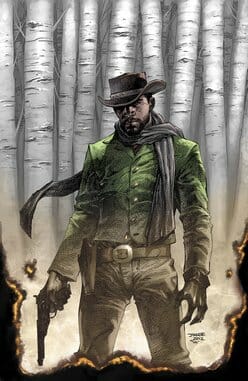
Writer: Quentin Tarantino
Artists: R.M. Guera and Jason Latour
Publisher: Vertigo
2012
Quentin Tarantino may be a master of obscure grindhouse escapism, but he’s also pulled inspiration from comic books on more than one occasion. If the elaborate Superman monologue at the end of Kill Bill: Vol. 2 wasn’t evidence enough, the polarizing director also allegedly wrote a script for an unproduced Silver Surfer feature in the early 90’s. This shouldn’t be a surprise to anyone familiar with the director’s genre overkill; Tarantino’s 2-punch dialogue would fit in just as nicely in a Silver Age crime book as a forgotten drive-thru relic. Well, maybe without the ethnic slurs and megaphone profanity.
In the case of Vertigo’s new adaptation of Django Unchained, Tarantino openly confesses his long-running affair with funny books, name dropping pulpy Western icons like Kid Colt Outlaw, TOMAHAWK, The Rawhide Kid, and Gunhawks in his forward. And while America will have to wait another week for Django’s theatrical release, this pitch-perfect translation is as fun as the sepia-toned works that paved its way, if not as enjoyable as its author’s stylish films.
Django is a field slave adopted by ex-dentist bounty hunter Dr. King Schultz, who’s searching for his new partner’s vile ex-owners. Django serves as a reader surrogate for Schultz’ wild ride, filled with clever antics and absorbing dialogue (mix one part German vernacular with two parts condescending dandy rhetoric). At this point in the narrative, it’s Schultz’ show as the moral center and plot driver, leading the bewilderedd Django through gunfights and cons to divine their next bounty. Much like Inglorious Basterds, the overarching story functions as a revisionist revenge fantasy to address one of history’s darkest episodes. Seen through flashbacks, the villains (who have yet to include main baddy Calvin Candie) are cartoonish sociopaths who exist primarily for a looming fatality and double entendre, rather than to explore the dire subject presented. Then again, exploitation has always been Tarantino’s speciality, and he’s damn good at it. The reader may be emotionally manipulated into rooting against an obtuse evil, but when the jokes, action, and characterization are this compelling, it’s difficult to claim a clear victim.
Fresh off his run on the Indian Reservation epic Scalped, R.M. Guera pencils and inks directly from Tarantino’s first draft script (yay bonus scenes!). Bluntly, Guera is the new standard of gritty and grim. His faces are etched in creases and shading that belie miles of frontier hardship, setting an inky, desperate tone to complement Tarantino’s manic violence.


